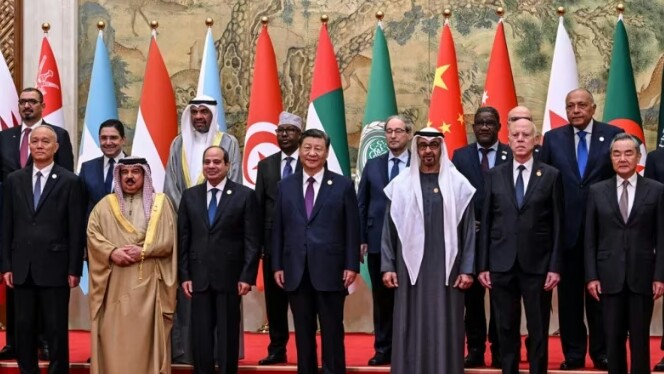Last month, in Beijing, the China-Arab States Cooperation Forum held a coordination meeting with the leaders and foreign ministers of 22 Arab League states to discuss focusing on economic cooperation and important issues such as counterterrorism, climate change, and human rights.
Ahmed Aboul Gheit, Secretary-General of the League of Arab States, mentioned that before the establishment of the forum, the volume of trade didn’t exceed $36 billion a year. However, last year in 2023, it reached around $400 billion, which is more than ten times the previous amount. Therefore, the importance of the forum is highly significant.
China’s President stated, “I always find it hard to form meet Arab friends. The friendship between the Chinese and Arab people is deeply rooted in our friendly exchanges along the ancient silk roads, in our joint struggles for national liberation, and in our win-win cooperation in promoting national development.”
Moreover, China’s growing influence extends far beyond its borders, from the Pacific to Africa and the Middle East, with strategic investments. Furthermore, China is expanding its maritime ambitions by investing in ports in Sri Lanka and Pakistan. Across Latin America, major infrastructure projects are driving growth with Chinese investment. However, all of these indicators suggest that China is now a rising power in the world.
So, can China replace the USA and Europe in the Middle East?
Last year, China and the Arab world signed a treaty worth ten billion dollars, a significant portion of which would be primarily used for Saudi Arabia. Additionally, the Saudi Investment Ministry and Chinese companies like Human Horizon have a Memorandum of Understanding worth around 5.6 billion dollars. Not only in the tech industry, but China also has agreements with several sectors in Saudi Arabia such as agriculture, renewable energy, housing, natural resources, and the tourism industry, among others. According to Saudi authorities, there is a possibility that an iron factory will be established soon. For this purpose, AMR-AL-ULA company and an international group from Hong Kong have developed an agreement worth approximately 533 million dollars. There is also a memorandum of agreement between China National Geological and Mining Corporation and Riyadh for a copper mine worth 500 million. At the end of 2022, China’s President made an official visit to Saudi Arabia, during which President Xi Jinping signed a pact worth 50 billion dollars. These developments have not been welcomed by Washington as usual. Despite this, Saudi Minister of Energy, Prince Abdul Aziz Bin Salman, stated that no matter who you are, if there is an opportunity, businessmen will definitely be there. Interestingly, the US Secretary of State, Antony Blinken, also visited Saudi Arabia just a week before Xi Jinping’s visit.
As a top leader in world trade, China has established itself in the UAE. Trade without oil exceeded $7.2 billion in 2022. By 2030, both countries have set a goal to reach $20 billion in bilateral business. Simultaneously, in the Hainan province alone, the UAE experienced a record high of $65.3 million in exports, indicating a 98.2% increase. In contrast, the importation rate is also high, at 110.6%, which amounts to approximately $25.8 million.
Very recently, the Chinese President met with Egyptian President Abdel Fattah El-Sisi. Sisi also participated in the China-Arab States Cooperation Forum meeting. Xi Jinping mentioned that it has been almost 68 years since Egypt was the first nation among Arab and African countries to establish diplomatic relations with the People’s Republic of China. Despite the various ups and downs in international politics since then, the two countries have always maintained faith in each other, provided assistance whenever needed, and worked towards development.
Like other countries, Egypt also experienced a significant downturn as a result of the Russia-Ukraine war. This led to a sharp decline in imported goods like wheat. Additionally, the Egyptian pound lost half of its value after the month of March. Malfunctioning and high inflation reached their peak during this period. During this challenging time, the China Development Bank offered a substantial financial package of $100 million, while the Asian Infrastructure Investment Bank offered around $40 million, which is undoubtedly influenced by Chinese authority. On the other hand, the World Bank and the IMF also offered $110 million and $300 million, respectively.
In this scenario, Egypt has always maintained a balanced approach when seeking loans from China, the World Bank, and the IMF. Egypt is the largest economic zone in the Middle East, and African countries like Egypt play a crucial role. China is likely to expand its influence in Arab states and Africa, especially through China’s Belt and Road Initiative.
That’s enough to prove that China is the new rising power in the Middle East and can be an influential factor, whereas we have traditionally only considered America and the EU in discussions of business alliances in the Middle East.






